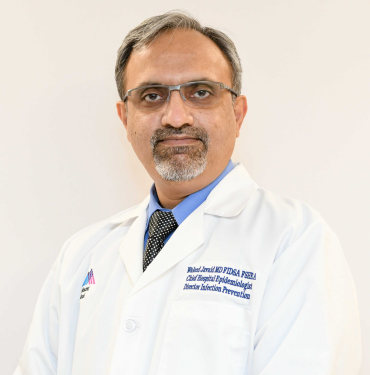For over a decade, Dr. Waleed Javaid has been a nationally recognized leader in infection control, working with various hospitals and healthcare organizations. Under his leadership, hospitals have achieved a significant decrease in hospital-acquired infections. He is currently a hospital epidemiologist and the director of infection prevention and control at the Mount Sinai Health System. He is also a professor of medicine at the Icahn School of Medicine at Mount Sinai. While already well-established in his field, he is now a student in the Executive MBA/MS in Healthcare Leadership program, where he aims to better understand the business of healthcare.
Dr. Javaid’s interest in the master’s program was largely influenced by his experience with disease outbreaks, and the challenges these bring to communication, finances, and planning. He was instrumental in hospital responses during the 2014-2016 Ebola outbreak, wherein he noticed a disconnect between the reality at hospitals and the guidance issued by the public health agencies. He recognized that a single case of Ebola could result in substantial financial constraints on a hospital that was not adequately prepared. During the COVID-19 crisis, hospitals faced similar financial constraints and an increased risk of hospital-onset infection. He was motivated to learn more about hospital finances, and consequently improve the coordination between public health agencies and the staff and patients in healthcare settings.
After his experiences during the Ebola outbreak, he began sharing his firsthand experience at the hospital during the COVID-19 pandemic to aid others in their decision-making. He is a regular guest expert for various media outlets, which means that higher rates of infection often correspond with a busier schedule for him. The program’s weekend format stood out to him as best suited to his schedule.
“This program is specifically designed for people like me,” he said. “When I was looking for master’s programs, I wanted to attend classes and have the professors available to me. Compared to programs that are remote, this was a perfect fit. It’s on weekends, but it’s only for two years. There are also four residential sessions—four weeks out of two years—where I have to be away from work, which felt very reasonable.”
Dr. Javaid is in his first year and has taken various classes that address leadership, business strategy, economics, and statistics—all of which he finds both interesting and personally relevant. He’s especially impressed with his current business strategy class taught by Dr. Vrinda Kadiyali, director of graduate studies for the graduate field of management, who he describes as approachable, engaging, and able to simplify complex information. He also enjoyed his health policy and economics class taught by Dr. William Schpero, assistant professor of population health sciences.
“It gives me great confidence to see that Dr. Schpero is published in a variety of journals,” he explained. “He understands concepts thoroughly and is one of those people who you’d want to talk to if you read his research. As students, we actually have that opportunity to speak with published educators.”
Since his first week in the program, he’s been appreciative of the team coaching, wherein teams of students are assigned a coach that helps navigate their group dynamic. Students take DISC evaluations, which coaches use to identify each person’s strengths and areas for improvement. Dr. Javaid knows the value of a successful team in his workplace and believes a strong team is equally beneficial in an executive program. His team is composed of other healthcare professionals and leaders, who provide meaningful and tangible solutions to class projects. He is excited to take the lessons learned from his projects and team experience into the real world.
“Everyone, including myself, needs coaching at some point in their career, or even constant coaching. If you’re doing a master’s program, you don’t want everyone to say you’re perfect,” he said. “The structure we’re given provides us the chance to look inward and become better leaders overall.”
As Dr. Javaid looks ahead in his career, he is eager to continue doing meaningful work in patient safety while providing national leadership in improving patient experience and outcomes. He wants to consistently improve coordination between healthcare organizations to ensure they are equally well-informed and equipped to handle crises. With the EMBA/MS in Healthcare Leadership, he expects to have the knowledge and skill set to be an agent of change, positively impacting public policy and providing the safest, highest quality of care to patients.


